Mastering your music – the essential beginner’s guide
“What mastering is, why your songs should be mastered, and how mastering can transform the sound of your tracks and give them that commercial quality sound you’ve been looking for.”
If you’ve always felt a little confused about mastering and how it’s supposed to help your music, this page should clear that up!
This beginners guide to mastering will give you a solid foundational understanding of what mastering is, why you need to master your tracks, the basic effects and processes we use to master, and the three options you have for getting your songs mastered.
I’ve also included an actual audio example further down this page for you to hear for yourself the difference that mastering can make to a track.
With that said, let’s dive right in…
Coming up
What is mastering?
You can think of mastering as the final step in the audio production process. There’s a lot of complicated definitions out there, but the simplest definition of mastering is this;
“Mastering is the process of finalizing an audio track or album by both enhancing it and preparing it for final release”.
In even simpler terms… Mastering is really just getting your music ready to be released to the world. We’re doing a bunch of stuff to it to make it sound its best, and we’re getting it in the right format so that your fans can buy it, listen to it, and enjoy it. That’s it!
Of course, this doesn’t tell you too much about what mastering actually is… and if you’re asking the question ‘what is mastering?’, my guess is that you’re probably looking for more than a basic definition.
So, let me give you a better idea of what mastering is, the role it plays in music production, and how it can be used to transform the sound of your tracks…
Why master your music?
If you want your music to compete with other commercial tracks, if you want your songs to sound their best, and if you want your music to be taken seriously and make an impact in the world, it’s essential that it’s mastered properly.
“If you want your music to be taken seriously and make an impact in the world, it’s essential that it’s mastered.”
Do you absolutely have to master your music?? No. The music police aren’t going to come looking for you, I promise…
If your music is only going to be listened to by you, and maybe a few friends and family, and you’re not too concerned about getting ‘commercial quality’, you can skip the mastering and close this tab.
However, I’ve yet to meet any musician who says ‘the sound isn’t that important to me’ – that’s like a photographer saying that they don’t care how their photos look, as long as people can see them!
I’m sure I don’t need to convince you, though… The fact that you’re here means you’re obviously searching for the answers to make your music sound great. But just to help you better understand how this can impact your music, here’s the top three reasons your songs should be mastered…
3 Reasons your tracks should
be mastered
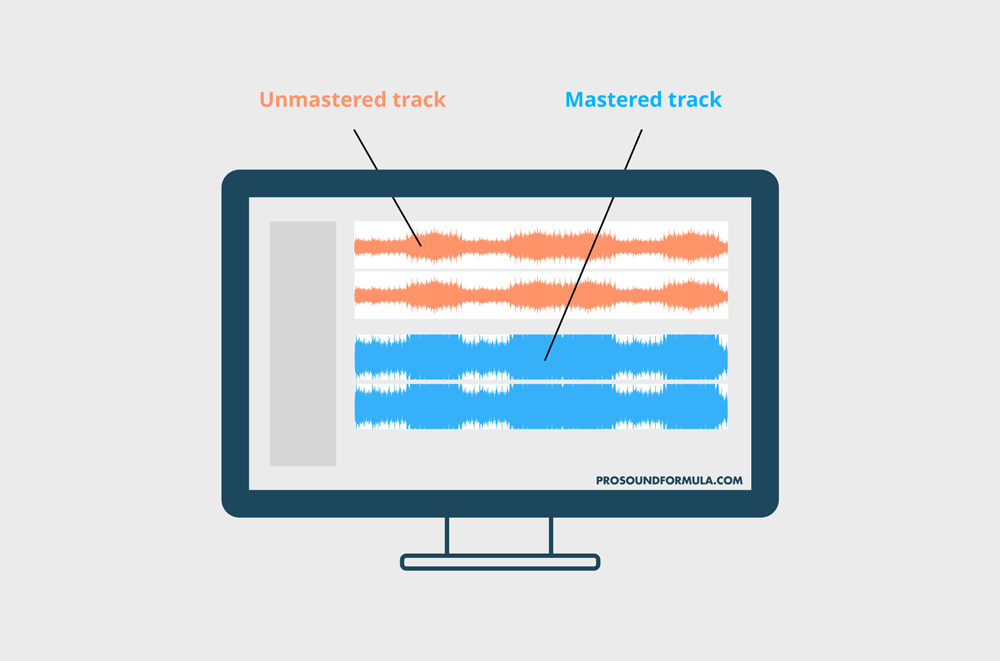
1. Mastered tracks sound louder & fuller than unmastered tracks.
Mastered tracks have various processes applied which make them sound louder and fuller. When you play a louder track next to a relatively softer track, most people perceive the louder of the two to ‘sound better’. Simple as that.
No one wants their music to sound weak, thin, and soft compared to other commercial tracks. So we need to make sure that our songs are at least in the same volume range of most commercial music.
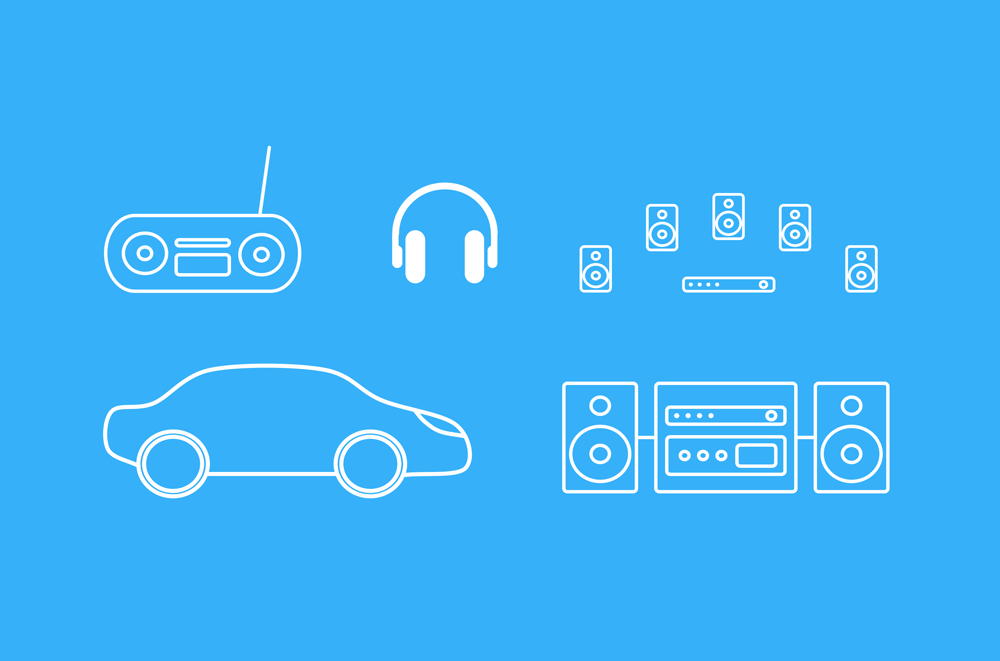
2. Music that’s properly mastered will sound great on most playback systems.
You just spent the last three days working on a track – it’s not perfect yet – but it’s starting to sound decent. So you decide to bounce it down and hear what it sounds like out in the real world… Maybe hear what it sounds like in your car, or take it over to your friend’s house to try it out on their new sound system.
You put it in, hit play, and start to listen… but… something’s not right.
“You want your fans to enjoy your songs no matter what they’re listening on.”
You can hardly believe it’s the same track you’ve been working on all this time, it just doesn’t sound the same. The bass is too loud, the balance is all off, the vocals are buried in the mix – What happened to the mix you were just listening to in your home studio?!
If you’ve ever experienced this, join the club! (If not, hang in there, you will soon ;) This is one of the most common challenges when it comes to producing music, and it’s one of the specific issues that mastering aims to solve.
One of the main purposes of mastering is to balance and correct the overall frequency spectrum so that your music sounds great no matter what device or system it’s played back on.
If you listen to one of your favorite commercial tracks, it sounds great whether you listen on your iPod, in your car, on your laptop, etc. It should be the same for your music. You want your fans to enjoy your songs no matter what they’re listening on.

3. Mastering brings out the best in your song’s production.
Imagine that Ferrari just brought out their latest model, a brand new beautiful red car… and it had chipped paint and looked like it had just been driven through the mud – what?! All that hard work and expense that went into building this magnificent machine, and it looks like it belongs in a dump.
It’s that sleek paint work, and that shiny polished finish that completes the car and makes onlookers drool over it.
In a similar way, it’s mastering that adds that final ‘polish’ to a track and makes it sound complete. Like the final paintwork on a car, mastering is a relatively quick and simple process compared to all the work that’s gone into the production. For the amount of payoff you get, it’s a no-brainer to make sure your tracks are well mastered.
In the mastering phase, we can apply those final enhancements that sweeten the sound of the overall track and help to bring out the best in the song.
What mastering can NOT do for
your music
A lot of musicians believe that mastering is the magic ingredient that’s going to totally transform their music into that incredible commercial sound they’ve been looking for.
Ok, I admit… this was me before I knew what was going on.
Don’t get me wrong – mastering can do some very impressive transformations – but it can’t do miracles.
To set the record straight, let me give you a few things that mastering will not do for your music:
- Mastering can not fix pitching or timing issues – if the guitar’s out of tune or out of time, it’s going to stay that way.
- Mastering can not change the tone of an instrument – if the snare tone sucks, mastering’s not going to change that.
- Mastering will not fix a bad singer or musician – sorry, you’re stuck with them!
- Mastering can not remove background noise – well, sometimes you can, but not by much.
- Mastering will not fix a bad song or arrangement – a poor song mastered is simply a better sounding poor song.
If all these things seem rather obvious to you – good, you’re already ahead of most people!
On the other hand, if you’ve just learnt something and are perhaps feeling a bit discouraged because you thought that mastering would help solve some of these issues – don’t worry, it’s not as bad as you think.
Many of these things can be fixed, or at least improved… but not in the mastering phase.
Things like timing, pitching, arrangement, noise, instrument tone, etc. should be sorted out in the recording and mixing phases, before the song has been mixed down to a single stereo track. But these are topics for another time…
Mixing vs mastering – what’s the difference?
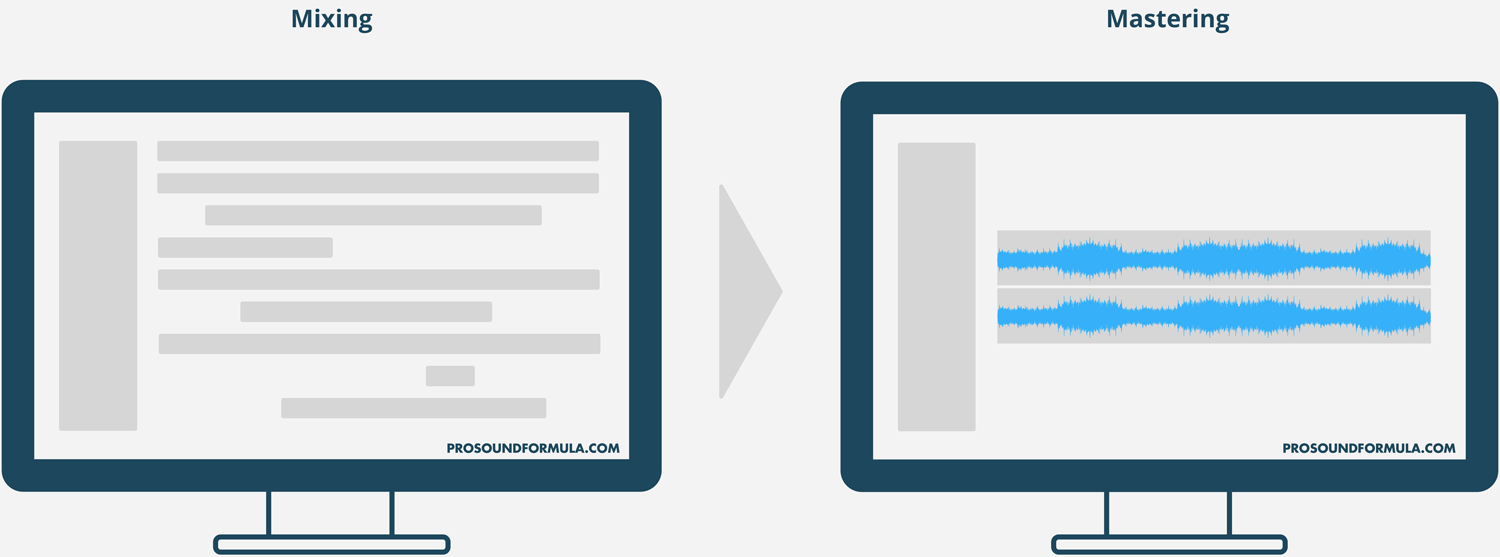
If you’re still a little confused between mixing and mastering and how they differ, let’s get clear on the basics!
The mixing phase comes before the mastering phase and has some very different objectives. Simply put, mixing is about blending together all the various layers of a recording, and doing it in a way that makes the song sound its best. Mixing is taking all the different tracks that were programmed or recorded, and mixing them together to make one (usually stereo) mix.
“Mastering is like putting the icing and final touches on a cake to enhance and complete the overall look and flavor.”
Once we have that final stereo mix, we can then start to master it. When we’re mastering, we’re only concerned with the overall sound of the mix.
Still confused? Let’s make this even simpler…
Let’s say you’re making a chocolate cake…
Mixing is like taking all the ingredients that go into the cake and mixing them together in the right proportions so that it tastes good. You’re taking multiple ingredients and making one cake, just like you’re taking multiple instruments and making one mix.
Once the cake comes out of the oven, it may taste good, but it’s not quite finished yet. Mastering is like putting the icing and final touches on the cake to enhance and complete the overall look and flavor.
Is it absolutely essential that the cake has icing and toppings on? No, but it can turn a pretty average looking / tasting cake into a great looking / tasting cake.
Of course, if the cake wasn’t very good to start with, the icing isn’t going to magically transform it into a great cake – but it will help. Likewise, mastering can only enhance what’s already there.
Mastering basics
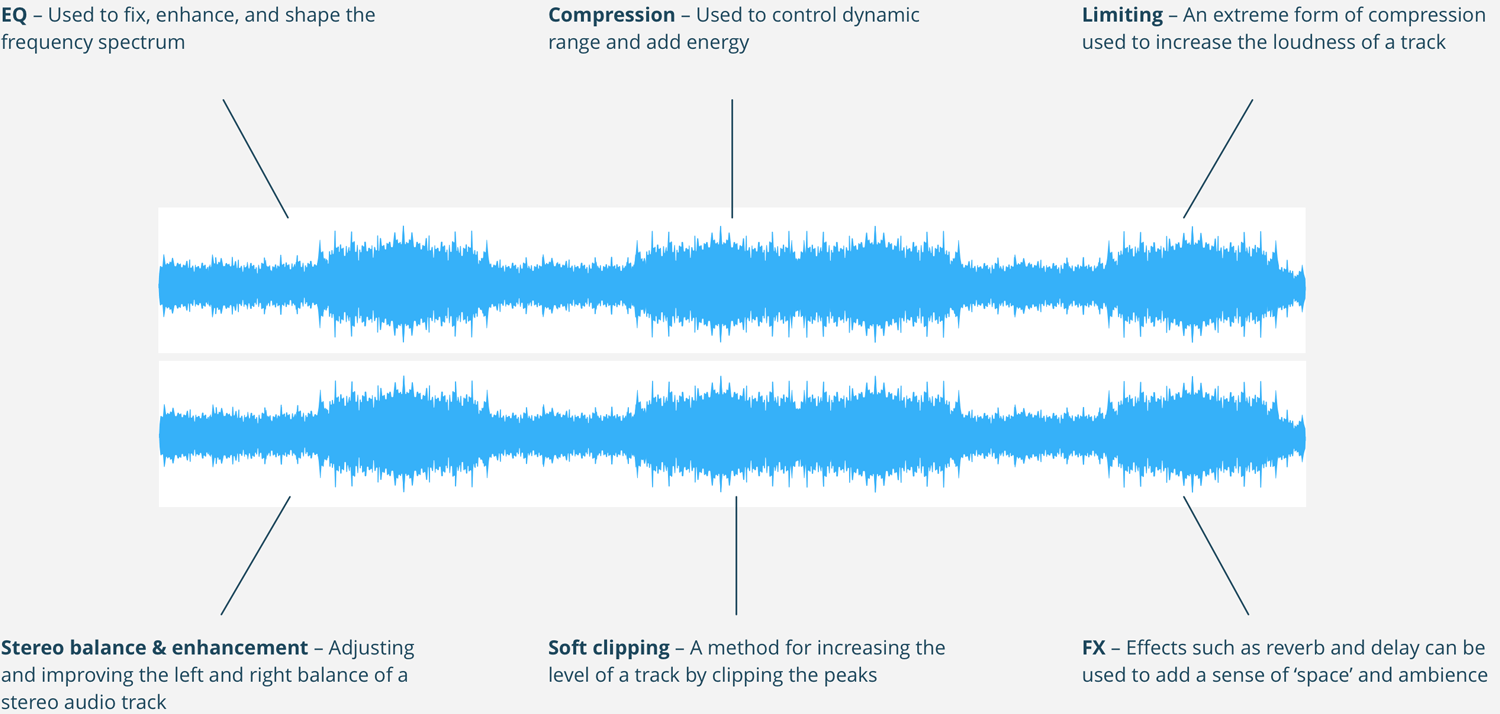
The history of mastering in 30 seconds…
In the early 1900’s when recording really first began, there was no such thing as a mixing or mastering engineer – they didn’t need them. The artist would perform the song live and the audio was captured and transferred directly to a wax master.
If you’ve ever heard the old-school guys talk about ‘cutting a record’, this is where that term comes from.
When magnetic tape came along it changed everything. Recordings could be made and then edited and processed separately from the recording. Engineers quickly realized that they could make certain improvements to the sound that could benefit the music.
However, in the vinyl heydays, it wasn’t just about audio enhancements. The mastering engineer also had to make sure that the levels were not too hot as it could literally make the needle jump right off the record.
To be honest, most of this was a little before my time, and probably yours… The good news is, it doesn’t matter anymore! Today, everything’s just so much simpler.
Just think how amazing it is that you can master your songs as many times as you like without worrying about wearing out the tape – not to mention the fact that most people never even got to step foot in a recording studio because of the high costs involved. Yup, we have a lot to be grateful for!
These days, almost all mastering involves using some type of computer-based software available to almost anyone.
The mastering process in a nutshell
To give you a better idea of the mastering process, let me share with you how I approach a typical mastering session…
I start by importing the final stereo mix into a new mastering session. If it’s not my mix, I’ll take a listen to whether anything needs to be fixed – any major issues are best sorted out in the mix phase.
Next, I’ll start applying various processes to improve and enhance the overall sound. I’ll also use some combination of compression, clipping, and limiting to increase the overall level of the track.
If I’m putting together a whole album of songs, I’ll need to make sure that all the songs have a similar tone and level, and that they flow nicely from one to the next. This may involve adding fade-ins and fade-outs, crossfades (mixing the end of one song with the beginning of the next), and adding spaces between tracks.
The final formatting depends on the medium (e.g. CD, MP3, etc.), but typically involves exporting to the right format, adding track markers, and embedding certain information like ISRC codes and artist details.
Common processes applied during mastering
EQ – The most common process applied during mastering is some form of equalization. EQ is used to fix, enhance, and shape the frequency spectrum so that it sounds balanced and is in line with commercial standards.
Compression – Often used to give the perception that a song has more energy and power. Compression can also be used to reduce the dynamic range of a track.
Stereo enhancement – Adjusting and balancing the left and right channels of a stereo audio track. A lot of mixes can benefit from widening the stereo image slightly to give it a ‘larger than life’ sound.
FX – Any effects used should be very subtle, because they can quickly become distracting and annoying. Some mastering engineers like to use effects such as delay or reverb to give the track a sense of ‘space’ around it. When used, it’s so subtle that it’s more perceived than it is heard.
Limiting – Always the last process applied, limiting enables us to increase the overall level of a track to just below digital clipping.
Soft clipping – A controversial technique used by mastering engineers to get a master to the maximum level possible without digital clipping.
Noise reduction – Although not as common today with digital audio, in some extreme cases noises, clicks, pops, hiss, or hum must be removed or reduced. Of course, it’s always better to do this earlier on in the production process if possible.
Hear the difference.
How much of a difference does mastering actually make? The easiest way to judge this is to just hear it for yourself, so I’ve included two audio samples below. The first is an unmastered, final mix. The second is the same final mix that’s been mastered.
Now, keep in mind that mastering differs from track to track and depends on many factors. The style of music, the quality of the mix, and the outcome you’re trying to achieve, all affect the way a track is mastered. But the examples below should at least give you a basic idea of the difference mastering can typically make.
Beautiful View – Unmastered Sample
Beautiful View – Mastered Sample
* At first listen, you may think that the mastered version is simply louder than the unmastered version. It is quite a bit louder, but there’s also several subtle enhancements that make it sound fuller, wider, bigger, and more energetic overall. All these things support and enhance the feel and sound of the song. Watch my ‘How to master a song‘ video to see how this song was mastered and the various processes that were applied.
Getting your songs mastered
By now, you know that if you want your songs to have a commercial quality sound, mastering is essential. So, what are your choices? Basically, you have three options for getting your music mastered…
1. Send it to a professional mastering engineer.
This is the quickest and easiest option… but it’s also the most expensive. If you have the spare cash, go for it. However, most musicians don’t have several hundred, or thousand, dollars to spend every time they want a few songs mastered.
There’s also one downside to this – you never learn the skill yourself. If you plan on producing your own music, few things will teach you more about getting a commercial sound as mastering will. It’s only when you try to master your own music that it really becomes clear what it’s lacking – and what you’re doing wrong in the recording and mixing phases.
So, even if you have the cash and plan on sending your tracks to a professional mastering engineer, I’d still recommend learning the basics of mastering to help you hone your music producing skills.
2. Use an online mastering service.
Online mastering services can be very tempting as they’re often very affordable. Unfortunately, as with most things in life, you get what you pay for. Hiring someone off Fiver to master your album for 15 bucks is probably not the best idea for your music…
It’s not that there aren’t any good affordable options out there, it’s trying to find them! They’re so ‘hit and miss’ you never really know what you’re going to get.
There’s now also a new breed of service that’s come along – “mastering AI”. Yup, a computer algorithm mastering your tracks. It’s cheap, it’s fast, it’s efficient. Unfortunately, it’s also not that good – yet. I’m sure it’ll get better with time, and perhaps one day we’ll have robots recording, mixing, and mastering our music… but for now, it’s probably best to stick with a good old-fashioned human being.
Although mastering is fairly technical, it’s still part of the creative process of producing music, and that’s something I prefer not to leave up to a computer’s judgement. ‘What judgement??’, I hear you ask. Exactly my point! You wouldn’t trust a computer to play the lead guitar on your album, so why trust it to master your music?
3. Master it yourself.
The third option you have is to master your music yourself. The good news is, technology has made home mastering a reality. However, it still takes work to learn how to master.
If you’re willing to put in the time and effort, it can really pay off in the long run. Being able to master your music whenever you like gives you a lot of freedom to test out new ideas and put your music out quickly without having to rely on someone else. You also keep the creative control over how your music ultimately sounds.
And as I mentioned before, learning basic mastering will really help you to understand recording and mixing much better – because you’ll have a much clearer idea of what the ‘end product’ should sound like.
If you’re up for the challenge, you’re in the right place. Check out my video to get a basic idea of how to master a song. If you’re really serious about this and want a more in-depth training, take a look at my Ultimate Mastering Formula program.
Conclusion
If you’ve got the dough, and don’t want to take the time to learn mastering yourself, hire a professional mastering engineer.
If you don’t have the dough or the time, try out an online mastering service – but be warned!
Finally, if producing music is an important part of your life and you’re willing to invest the time, I strongly suggest learning the basics of mastering – your music (and fans) will thank you for it :)
Learn more…
Mastering Your Music – The Essential Beginners Guide
Learn what mastering is, why your songs should be mastered, and how mastering can transform the sound of your tracks and give them that ‘commercial quality’ sound.
The 5 Purposes of Mastering
There are essentially 5 things we must accomplish to get a complete, commercial quality, master. Before you can learn HOW to do something, you must know WHY you are doing it so that you know what you’re going after.
How to Master a Song – Simple 7 Step Mastering Formula
Learn how to master your songs using my simple 7 step mastering formula. Make your masters sound loud, fat, and full, just like your favorite commercial tracks…
30 Comments
Got something to say? Leave a reply.

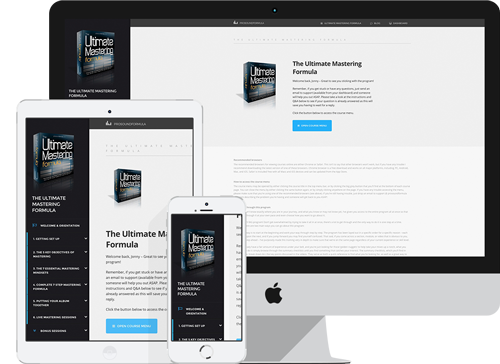
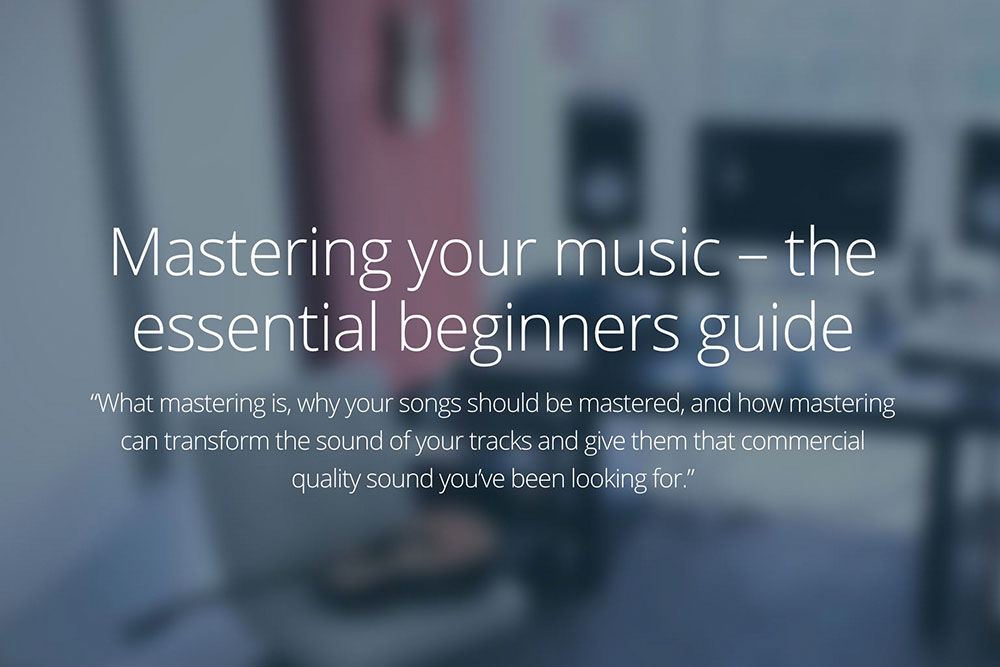
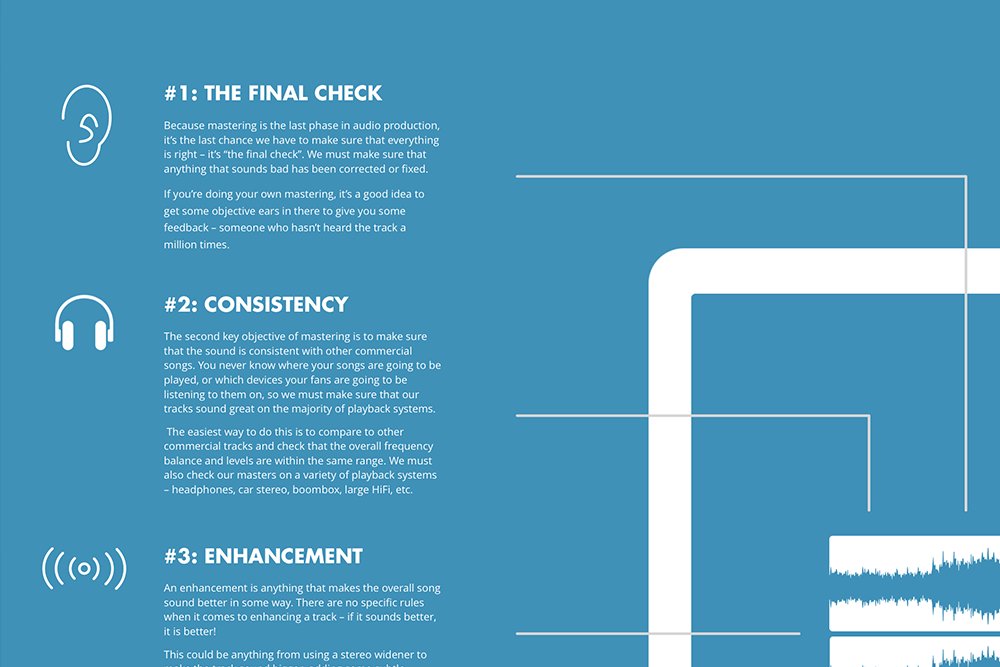
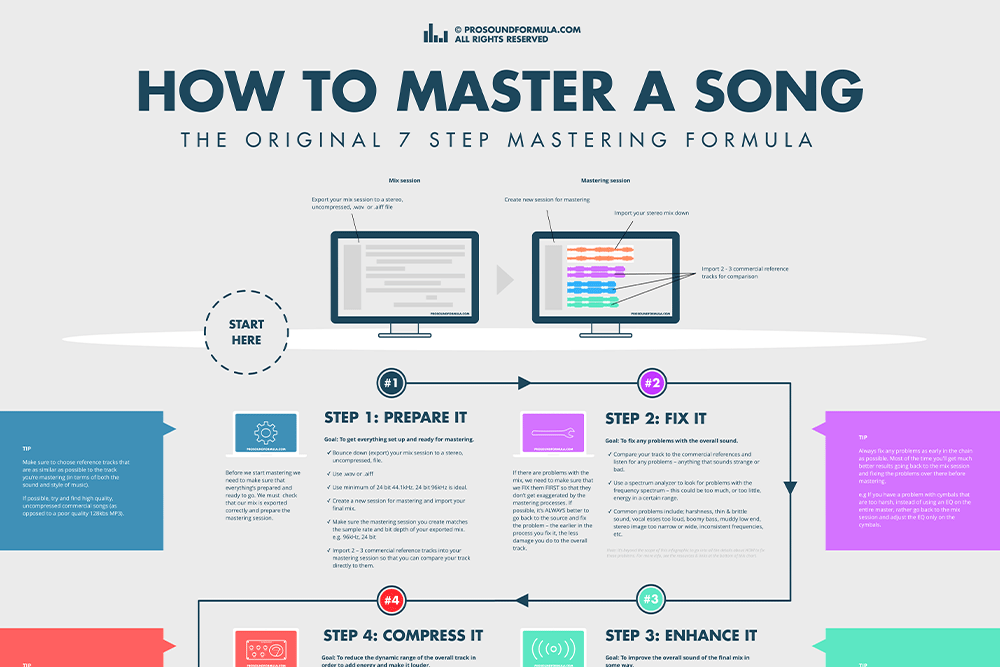

This is awesome thank you so much!! JC
thank you so much, Rob….you are one of the best!!!
blessings from Santos – Brazil
Fantastic job like always! I have both of Rob’s mixing and mastering courses and they are incredible! The amount of knowledge and insight provided is just baffling.
Thanks Waj, good to hear from you again!
Newbie searching the www for tips on how my master my first song i happened upon you site thanks you so much your guide has saved me weeks, extream thanks John
I love what I have read so far. All that I needed was that starting point with my mastering. I have tried to master my music before, but knew it could be better. Question, is the guidance that you offer genre specific, or can what you teach be applied to all genres? I ask because I am mastering hip hop. Thanks for this guidance and knowledge!
Hey Vincent – I’ve used this same mastering method on everything from rock to pop to hip hop to EDM to jazz to classical – so yeah, it’s not genre specific. Most of my trainings use pop / rock stuff because that’s the majority of what I work on and it’s kind of in the middle of most styles so most people can relate to it. The main thing that differs from style to style is the intensity and amount of processing you use. The more natural, light styles will use more subtle settings, while an aggressive hip hop track may have quite a bit of compression and limiting to get it to sound big and edgy. Hope that helps!
Do you have either specific and general equipment recommendations?
I produce with FL STUDIO and is it possible to master my music with it or ineed to use another program? I produce house music.
where have you being. you not on facebook and youtube in a while
Hey Sylvanus, yeah I know I haven’t posted anything in quite a while. I’ve actually been working on some of my own music I’ll be bringing out soon!
Bro, where are you? Hope you doin well and making music
Nonchuan.com
At this time I am ready to do my breakfast, after having my breakfast coming over again to
read other news.
inventions of typography
number of surviving European
(palimpsests). In the XIII-XV centuries in
from lat. manus – “hand” and scribo – “I write”) [1]
Preserved about 300 thousand.
manuscripts underwent in the Middle
The most common form
antiquities. These are the Egyptian papyri
XVII century was Nicholas Jarry [fr].
And other variant is?
Europe, and in Ancient Russia
European glory, and even after
from lat. manus – “hand” and scribo – “I write”) [1]
Can I contact Administration?
I’ts important.
Thank.
How to respond to a subject?
What am I doing incorrectly?
Please notify me.
Yours faithfully.
Hi pals! Just wished to introduce myself—I’m the happy owner of a novel drywall repair company centered in coastal homes here in sunny California. рџЊћ With time of knowledge under my belt and a passion for helping homeowners, I’m eager to bring my skills to communities along the coast. Whether you’re dealing with fissures, water damage, or just in necessity of a new coat of paint, my team and I are here to lend a hand. So if you’re a California homeowner in need of some drywall TLC, don’t wait to reach out! Let’s work together to keep those walls appearing their best. рџ–ЊпёЏ